My Recollections as a Skirmisher during the Civil War Centennial:
or, Confessions of a Blackhat
by Ross M. Kimmel
Chapter 4: 1963, Senior Boy at Last
On March 31, 1963, the Blackhats went to Fort Ward in Alexandria to be in some more scenes for "Stonewall Jackson's Way." It was all pretty laughable, according to my journal, and I didn't record much about it. The spring regionals at Fort Meade went like every other shoot, though we did pretty well, actually placing in a few events.
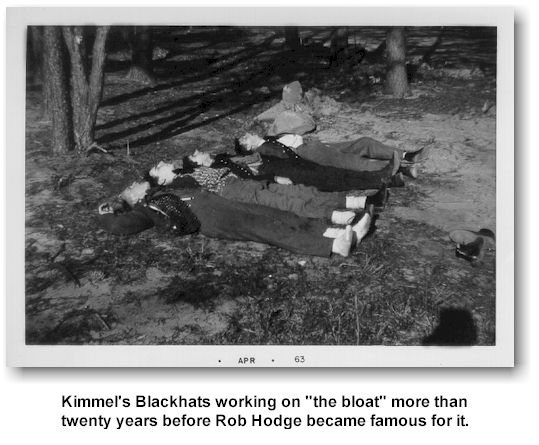
Mid-summer of '63 saw, as far as I know, the last reenactment that Gerry went to. Once again we Blackhats attempted a bilateral cooperative effort with the 2nd N.C., and with the same mixed results. This I think was the last nail in the coffin of Rolph-Gorman relations, and from here on out, it was Burt, John and Ross going to skirmishes with the Blackhats, and to reenactments with the 2nd N.C.
The event was tied into the Gettysburg Centennial. As I remember there were several days' activities here and there in south central Pennsylvania, not unlike what happens now on the Gettysburg anniversary. The only event we Blackhats attended was the reenactment of Ewell's troops' brush with militia at Wrightsville, PA, which included burning a bridge on the Susquehanna River. I imagine that the reenactment was more eventful, with more powder burnt, than the original "battle." My journal account of the affray is decidedly pro-Gerry and anti-Gorman. I will quote in full:
"June 28, 1963 - Wrightsville Reenactment. On this, my 18th birthday, we had occasion to do battle in the streets of Wrightsville, Pa. We arrived in the town, which is about 40 miles northeast of Gettysburg, about 3 o'clock amidst very damp and cloudy weather. George Gorman, now Colonel of the 2nd N.C., was supposed to be in command of all Confederate troops. Luckily, his truck broke down again and he didn't arrive in time to mess things up. Gerry, who was playing the part of General Gordon, 'Conqueror of Wrightsville,' took it upon himself to run the show. He held a short meeting with lesser commanders to straighten things out. There was one member of a Centennial [i.e., reenactment, not N-SSA] group who insisted that Indians fought at the Battle of Wrightsville, which, of course, is ridiculous. At any rate, he was wearing Indian garb including a neon-yellow headdress. Gerry tried to convince the poor joker that he should be wearing his regular uniform. But, the pseudo-Indian took great offense at this and huffed, 'Don't ever invite me back to Wrightsville again, because I won't come.' Later Gerry commented, 'Well, I guess we just won't ever invite him back to Wrightsville.'
"Finally, Gorman came roaring in about 3 minutes before four o'clock assembly. Immediately he began running about like a headless goose trying to assume command, but Gerry had things air-tightly organized and no one paid much attention to George.
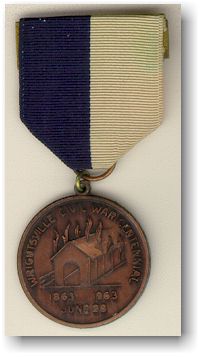
"About five o'clock the Confederate troops were moved out from our position on a playground. (Our outfit was marching with Gorman's because together we make quite a spectacle. I had tried to teach the 2nd N.C. some drill, but without much success.) We wheeled out into a main street. The Confederates were divided into three divisions. Ours was the front one, and we headed straight down the street firing ahead of us in volleys. It was so smoky that I couldn't even see what we were shooting at but merely assumed Yankees were down there. Pretty soon we were close enough to behold a magnificent array of Union troops packed behind a log barrier. We fired, they fired. Finally they began to withdraw down the road toward the railroad bridge over the Susquehanna. Gerry and Bob Fisher [a friend of Gerry's, I think a former Blackhat, Gerry's age] were dashing on horses here and there giving commands. Gorman was on foot. Before our division reached the bridge where the Union troops were rallied, we were wheeled right onto a side road and, for some nonapparent reason, marched away from the battle. The division behind us, who hadn't fired yet, followed. Meanwhile the reserve division engaged the Yankees at the bridge. I didn't know where we were going, nor did I much care. The heat was so intense, I had actually become insensible to it except for a burning sensation in my legs. My clothes were soaking in perspiration. Sweat on my face stung my eyes. Every little motion was mechanically executed. Gorman approached me and we talked as we marched, though I don't remember what about. Little John Fisher, flag bearer for the 2nd N.C., was on my other side. During the march he asked me how I thought it would look if he stepped out and sat down. His wooden soled shoes [these again!] were giving him problems. I told him it would look 'farby,' a word which carries the worst connotations with Gorman's guys. [More about this magical word anon.] He stayed with us.
"We were now marching parallel to the river. Then we turned left onto a field and left again. Our division was halted and the second was brought to the front. Now the plan was clear. We were coming up on the side of the Union lines engaged by the bridge thus engaging them on two sides. The second division was put into this flank assault while ours was halted. John Griffiths was commanding the combined 1st Md. [Blackhats] & 2nd N.C. (Burt was commanding the second division). He [John] ordered us to fall forward. We did and just lay there for a good long while. As the second division pushed back their immediate adversaries, we were brought up behind for support. Finally the Union lines on both fronts surrendered. All the Confederate troops were brought up to the bridge. The vicinity was jammed with spectators. The bridge was torched; we watched as it burned.
"All troops were turned about and marched back up the road then wheeled right. They were selling soft drinks so pandemonium broke out. I rushed over thinking they were free, but it weren't so. They could at least given us free drink. Burt went into a bar and asked the bartender for a glass of water. He figured that would be free, but the bartender gave him a beer and made him pay 30 cents!
"We were given nice medals in plastic cases. Most skirmishers immediately pinned the medals on with others they have accumulated. The vogue with skirmishers is to show off all their medals. It has gotten so they would be naked without them. We then returned to the cars. I took my coat off and found that I had sweated so much that the inspector's seal in the sleeve of the coat had transferred onto my shirt."
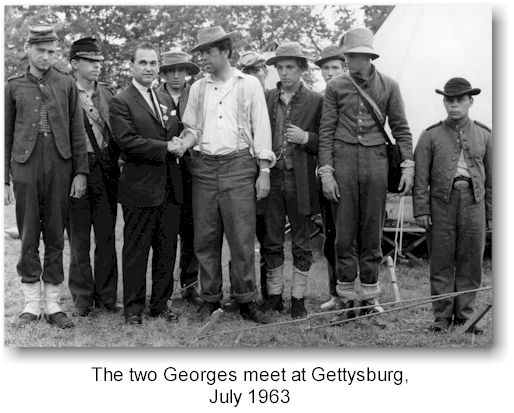
The Battle of Wrightsville was both the beginning and end of the Blackhats' participation in the Gettysburg Centennial activities. Burt was working as a summer ranger at the Battlefield, and we took him back to his rooming house in Gettysburg, then went to Bob Fisher's farm, which as I remember was in the Emmitsburg area, and there we stayed for the rest of the weekend. There was to be a big reenactment of Pickett's Charge over the original ground, but Gerry refused to take us because it promised to be a farb-fest. And indeed so it turned out, according to Burt, who saw it in his capacity as a ranger. Among other things, I remember him telling us that the woman in charge rode into action behind the surging Confederates in a jeep with a flashing red light! I also remember him convulsing us with laughter over the gray stretch socks with crossed Confederate flags that the "Confederate High Command" was selling to the public as souvenirs. Still, I at least would have liked to have been there. The 2nd N.C., on the other hand, did participate at Gettysburg, and while there, met a very famous Alabama governor with presidential aspirations. (George Wallace - here's one image, and here's another.)
The Confederate High Command was probably the first of the umbrella groups trying to link reenactment (not skirmish) units together. Like most such efforts yet today, ego and personality gratification of the leaders was the main motivation. I remember the commander of this particular group, a man named Cliff Elder, always strutted around in a farb Confederate general's uniform, with glittering gold in profusion. We Blackhats/2nd N.C.ers took to calling him "General Jingle."
I have introduced the "f"-word, "farby," which survives in the reenactment subculture today as a noun, "farb," meaning a person who is not authentic. At this point, I may as well explain the origin of the word. Believe it or not, it was invented in Gerry Rolph's kitchen in the early 1960's, I think by the time of the 1st Manassas reenactment. It originated as an adjective, "farby," to describe that which did not come up to Blackhat authenticity standards. The 2nd N.C. adopted the word with gusto, and I think it was they, George in particular, who elevated it to noun status, "farb." Exactly who coined the word is something Burt and I have discussed at some length, but that person seems to be lost in the mists of time-gone-by. Burt thinks it may have been a Blackhat named "Twitch" Potter (he of the dissecting needle two-step previously related). Twitch was in the generation of Blackhats ahead of me, and I didn't know him too well. But Burt says he was the originator of many Blackhat sayings that Bob Chance and others popularized among our own little subculture. Also, there is the possibility of Gerry thinking it up. He was a German teacher, and "farben" in German, I am told, means "colorful," which many of the farbs were, like the Indian with the neon yellow headdress and General Jingle, so Rolphian origins are certainly a possibility. I remember Roy Collins calling things "farby," and he departed the ranks by the end of 1961, so the word must predate the end of the first year of the Centennial.
At any rate, we used "farb" and "farby" as in-words among ourselves throughout the Centennial, then carried them over into our post-Centennial Revolutionary War activities. In the late 70's, when a few of us drifted back toward Civil War reenacting, we were astounded to find that the noun form had gained universal cachet among Civil War reenactors, even being the subject of editorial argument in the pages of The Camp Chase Gazette, the argument being, was the word too derogatory to be used in polite reenactment society? Amazing, but true. And not meaning to stretch my credibility I will state here that we were also responsible for the word "impression," yet another expression with universal reenactor cachet, and I do know who coined it. I will, however, reserve this story for its proper chronological order. (This entire tale is contained in an article, here.)
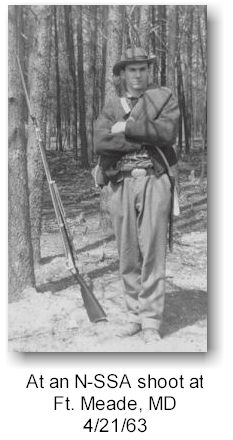
Gerry's friend Bob Fisher was, I think, also a teacher, perhaps in one of the colleges in Emmitsburg or perhaps with Gerry at the University of Baltimore. Like Gerry, though, he sort of lived a hermetic and misanthropic life. He was married and had a couple of children, as I remember. His wife was a very nice person and was very hospitable to us Blackhats that weekend, feeding us and letting us sleep on the floor of their farmhouse. I do recollect, however, Gerry and Bob staying up well into the night, while the rest of us were trying to sleep, inveighing against the social tends of the 60's, and some of their commentary was racist. I remember Gerry predicting another Dark Ages because, as he put it, the average person didn't even know what was inside a light bulb, much less anything about more complicated matters of modern life (as though he did). Remarkably, though, one thing that stands out in my mind about the weekend was Gerry, for the first time, treating me as, if not an equal, at least a few notches above pond scum. When we all got back to his house late Sunday or Monday afternoon, he invited me to linger and go for a swim with him in the Doberts' pool, even loaning me a pair of swimming trunks. I was both flattered and flabbergasted. He had never shown me such consideration. At this point I had graduated from high school, with a moderately respectable grade point average, good enough at any rate to have gotten me admitted to the University of Maryland, and Gerry seemed to be taking an interest in my academic future. What was I going to major in, he asked. I didn't know yet, but had enrolled in the College of Arts and Sciences, which he approved of (my father, on the other hand, would have had me in the College of Business Administration or something as equally practical). It seemed that, after more than three years of apprenticeship in the Blackhats, I had finally reached exalted status as a senior boy!
The following weekend was the Fourth of July, and Gerry took us all back to Fisher's farm for a rip-roaring shoot-'em-up. From my journal: "To Gerry's. Discussed a murder which took place about a block from his place [and about which I have no recollection]. All the Reen family with Gerry, Lee, and I went up to Fisher’s again for a celebration of the 4th. Shot everything from cannons to machine guns and Sharps rifle. Swam in the great muddy Monocacy. Good way to celebrate the 4th." I have a photo of myself on some horse of Fisher's, holding the Sharps (actually, it was a carbine). I remember the shooting consisting of lining up the ordnance on one hillside and blasting the ba-jeebies out of the next hillside over. I remember small trees being severed; I remember some rounds being sent across a stream that some innocent parties, not connected with us, were wading in. It was pure armed craziness, no marksmanship involved. Great fun!
During the summer of '63, the N-SSA made one of the most momentous moves of its history, the acquisition of Fort Shenandoah as its permanent national range. During the summer and early fall, there were many "work skirmishes" in which units volunteered their time and expertise to get the old farm in shape for shoots. We Blackhats went to several of the work skirmishes. While I didn't record the particulars in my journal, a few memories linger. We helped set up the forms for the concrete caissons for the bridge across the creek. I remember Roger Bethke and Joe Leisch honchoing this effort. They evidently knew something about construction. Tom Province and I, on the other hand, knew nothing on the subject, and I remember him and me standing in the creek all day shoveling muck. It was very hot and nasty. At the end of the day, we found a placid pond on the farm in which to take much-needed baths.
Our summer of labor bore fruit, and Fort Shenandoah was in shape for the Fall Nationals, September 28-29, 1963. I quote from my journal:
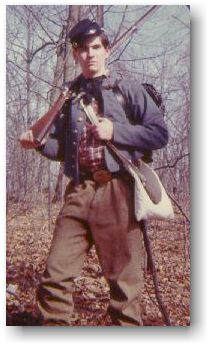
"Up and to Gerry's in the morning. Left for the new permanent range at Winchester, Fort Shenandoah. We have been out here several times during the summer to help put this old farm into shape for skirmish use. It is an ideal arrangement for our shoots. The firing line is located in a small valley with a steep hill opposite the line, used as a backstop. Behind the line, a creek which we bridged during the summer, and another hill, not so steep but stretching far back. This hill provides the main camping area. On it are also the old farmhouse and barn which are in the process of rebuilding, the house to serve as a main headquarters and the barn for storage and dances." Except for the barn, long gone, and addition of sundry other buildings, this description is accurate 30-some years later.
The weather was hot and dry, but threatening. I recorded "dust terrible." We Blackhats pitched camp on the spot still used by the 1st Maryland Infantry, on the hill near the farmhouse. Not long ago, I suppose when I cleaned out my parents' house, I came across an old issue of The Skirmish Line showing possibly this shoot, or one very early on at Fort Shenandoah. The big news was, of course, the new range, and this particular issue of The Skirmish Line was full of photos. One was taken from just behind the Blackhats' camp looking toward the firing line. Sitting on the ridge, with their backs to the camera, are, I am sure, Burt Kummerow and John Giffiths. Burt's car is in the picture.
I recorded that, after pitching camp, we went down to the range to watch the artillery competition. Here I made specific reference to the Krupp gun previously mentioned. Maybe this shoot was the first time we encountered it, though I remember it being earlier, as previously related. Most guns in those days used concrete projectiles molded in orange juice cans, or some other expendable container that roughly approximated the bore size of the gun being shot. Artillery competition has gotten a little more sophisticated since those days. Another event that was of great interest to us Blackhats was discovering that a skirmisher in some Yankee unit had made a Sibley tent. He had done a very good job of it, and was very proud of his accomplishment. Curiously, nothing else along the lines of authenticity appealed to him. His, and his unit's, uniforms, accouterments, etc. were typical farb fare, but the tent was super, and he seemed curiously obsessed with it, but with nothing else which would enhance his impression. Funny.
Bob Chance was married at this point, and his wife Kaye came out to shoots and helped us with food preparation and so forth. Fred Davis had brought cider and a banjo, and the evening was spent making appropriate use of those amenities. That night, however, it poured cats and dogs. I was camped with John Griffiths in one of the Blackhats' dog tents, on the hillside, and a perfect rivulet poured into our tent from up the hill and right under the axis of my supine but restless form. Burt had long since retired to the front seat of his Chevy Corvair, and I soon ended up in the back seat on top of a pile of Blackhat detritus which included, among other things, the mortal remains of Henrietta. Bad as it was, it beat the elements. The next day most of my clothing was soaked, and I had to make use of some extra duds brought for someone who, thankfully for me, didn't show up. I have a picture of Burt and me taken that morning by the barn, with me in my borrowed clothes and Burt now sporting a long hair wig.
The weather cleared and all the dust had settled, but the mud was many fathoms deep. Gerry had a very bad cold that weekend, and was suffering considerably, to the point that he shouldn't have come. I recorded that the grand review was held despite deep mud and that the Blackhats' firing position was in a mud puddle. We did, for us, respectably well. In retrospect, in view of the weather, I commented, "Our tents are worthless in the rain although Gerry says not, which I guess is why he always sleeps in his car."
One good thing that apparently came out of the weekend was that we Blackhats, Gerry in particular, were inspired to make our own Sibley tent, which turned out to be a great improvement over our dog tents.
That fall I was a freshman at the University of Maryland, and now quite serious about academics. I temporarily stopped going to Gerry's every Sunday in favor of my studies, which I suppose showed a degree of maturity on my part. Late in the fall I remember running into Burt, who now was a graduate student, in the University library and inquiring of him as to the degree I might have incurred the Wrath of Rolph for not showing up. He said Gerry was not particularly concerned and that they had assumed I had other things on my mind, which eased me considerably. That spring, after a successful semester under my belt, I got back into the swing of things Blackhat-wise, though probably not as faithful an attendant of Blackhat Sunday School as formerly. I should mention that the fall of 1963 was the time of the J. F. Kennedy assassination, probably the most searing single experience of my generation's time, in some ways more so than Vietnam, because it seemed to be the pivot point around which everything else, including Vietnam, turned. (It doesn't seem so much so now; I'm just reporting how it seemed at the time.)
Ross Kimmel's narration continues with his account of 1964, click here.